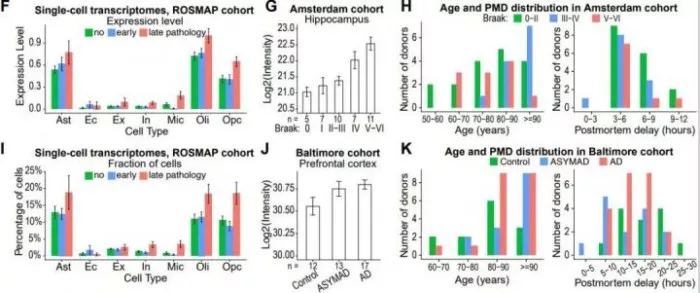Elevated levels of an enzyme called phgdh in the blood of older people may be an early warning sign of Alzheimer's disease, which is supported by new evidence led by a study led by the University of California, San Diego (UCSD). When analyzing brain tissue, the researchers observed a trend consistent with their previous findings in blood samples: in adults with different stages of Alzheimer's disease, the expression level of the gene encoding phgdh has been high, even in the early stages before cognitive symptoms appear**

These findings also prompted warnings about the use of dietary supplements containing amino acid serine as a remedy for Alzheimer's disease. The researchers warned that since phgdh is a key enzyme for serine production, the increased expression of phgdh found in patients with Alzheimer's disease indicates that the rate of serine production in the brain is also increasing, so taking additional serine may not be beneficial.
Researchers led by Zhong Sheng, a professor of bioengineering at the Jacobs School of engineering at the University of California, San Diego, and Chen Xu, a professor of Neuroscience at the school of medicine at the University of California, San Diego, published in [cell metabolism] on May 3, 2022( https://www.cell.com/cell-metabolism/fulltext/S1550-4131 (22)00052-3?_ returnURL=https%3A%2F%2Flinkinghub. elsevier. Their findings were published in the journal "com% 2fretrieve% 2fpii% 2fs1550413122000523% 3fshowall% 3dtrue".
The new study builds on the early work of Zhong Sheng and his colleagues, who first found that phgdh is a potential blood biomarker of Alzheimer's disease. The researchers analyzed blood samples from the elderly and found that phgdh gene expression increased sharply about two years before Alzheimer's disease patients and healthy people were diagnosed with the disease.
These results are promising, and researchers are curious whether this increase can be linked to the brain. In their new study, they show that this is indeed the case.

"What's exciting is that the blood biomarkers we previously found are now confirmed by brain data. Now we have strong evidence that the changes we see in human blood are directly related to the brain changes of Alzheimer's disease," Zhong said
The researchers analyzed genetic data collected from postmortem human brains from four different study cohorts, each consisting of 40 to 50 people aged 50 and older. These subjects included patients with Alzheimer's disease, so-called "asymptomatic" people (people without cognitive problems and no diagnosis of Alzheimer's disease, but their postmortem brain analysis showed early signs of Alzheimer's disease-related changes) and healthy controls.
The results showed that the expression of phgdh increased in Alzheimer's disease patients and asymptomatic patients in all four cohorts compared with healthy controls. In addition, the more advanced the disease, the higher the expression level. This trend was also observed in two different mouse models of Alzheimer's disease.
The researchers also compared the subjects' phgdh expression levels with their scores on two different clinical assessments: the Dementia Scale (which scores a person's memory and cognitive abilities) and Braak stage (which scores the severity of Alzheimer's disease according to the pathology of the brain. The results showed that the worse the score, the higher the phgdh expression in the brain.)
"The fact that the expression level of this gene is directly related to a person's cognitive ability and disease pathology is amazing. The ability to quantify these two complex indicators through a single molecular measurement may make it easier to diagnose and monitor the progress of Alzheimer's disease," Zhong said
The findings had an impact on serine supplements, which are advertised to improve memory and cognitive function. The key role responsible for the production of serine in the body is phgdh. Some researchers have suggested that the expression of phgdh will decrease in Alzheimer's disease, and increasing the intake of serine may contribute to treatment and prevention. Clinical trials are already underway to test serine therapy in older adults who experience cognitive decline.
However, because their data have always shown an increase in phgdh expression in Alzheimer's disease, the researchers believe that serine production may increase in this disease, contrary to what some other groups say.
"Anyone who wishes to recommend or take serine to alleviate the symptoms of Alzheimer's disease should be cautious," said co-author Riccardo calandrelli
The researchers hope to study how changing phgdh gene expression will affect the outcome of the disease. This approach may lead to new treatments for Alzheimer's disease.
Genemo, a biotechnology startup co founded by Professor Zhong, is working to develop a phgdh blood test for early detection of Alzheimer's disease.